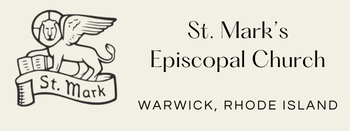Pastoral Offices
Other Sacraments and Rites
While Baptism and the Eucharist are the primary Christian sacraments, the Church has traditionally recognized other sacramental ways in which God is present to us.
Marriage – Christian marriage is intended for mutual joy; for the help and comfort given one another in prosperity and adversity; and when it is God’s will, for the procreation of children… (BCP pg. 423) Marriage in the church is an act of worship within the community of faith and it is therefore expected that at least one of the couple be a member of St. Mark’s. Canon law requires that a request to be married be made no less than 30 days in advance, but realistically much more time is need for planning and premarital counseling. No plans should be finalized before speaking with the rector to ensure that the date is available and the marriage will take place.
St. Mark’s is prepared to bless same-sex unions using the Liturgy approved by General Convention in 2012, The Witnessing and Blessing of a Lifelong Covenant. At least one member of the couple must be a member of St. Mark’s. The same expectations for planning and pre-marital counseling are in force for all couples.
Confession – The ministry of reconciliation, which has been committed by Christ to his Church, is exercised through the care each Christian has for others, through the common prayer of Christians assembled for public worship, and through the priesthood of the Church and its ministers declaring absolution. (BCP pg. 446) Confession is not required, but some choose to make one in response to a particular life event. When desired the Rite of Reconciliation of a Penitent is available. If you desire to make a confession please contact the rector to make an appointment. The Prayer Book makes it clear that the secrecy of a confession is morally absolute for the confessor (priest), and under no circumstances be broken.
Confirmation – In the course of their Christian development, those baptized at an early age are expected, when they are ready and have been duly prepared, to make a mature public affirmation of their faith and commitment to the responsibilities of their Baptism and receive the laying on of hands by the bishop. (BCP pg. 412) Confirmation takes place during the Great Fifty Days of Easter by deanery. The diocesan expectation is that the confirmand be in the tenth grade and prepared by the parish. Adults may also be confirmed, Received into the Episcopal Church, or make a Reaffirmation of Baptismal Vows.
Unction of the Sick – or anointing with oil is available to anyone who is ill. It is not “last rites” but rather prayers of healing rooted in our faith in Christ as healer, physically, spiritually, and emotionally. The Prayer Book reminds us that in case of illness, the Minister of the Congregation is to be notified. (BCP 453). Practically this is most important when one is in the hospital because HIPA privacy laws prevent the hospital from automatically contacting the church, even when the patient gives that information on admittance. Please contact the church office (737-3127) to arrange a pastoral visit.
Ordination – All of the baptized are called to a life of faith and ministry, but some are called by God and the Church to ordered ministry of deacon, priest and bishop. The Church has a careful and lengthy process of discernment and preparation for those who feel they may be called to Holy Orders. The process begins with conversation with one’s rector. If you feel God calling you to ordained ministry please initiate conversation with the rector.
Burial – The death of a member of the Church should be reported as soon as possible to, and arrangements for the funeral should be made in consultation with, the Minister of the Congregation. Baptized Christians are properly buried from the church. The service should be held at a time when the congregation has opportunity to be present (BCP pg. 468).
